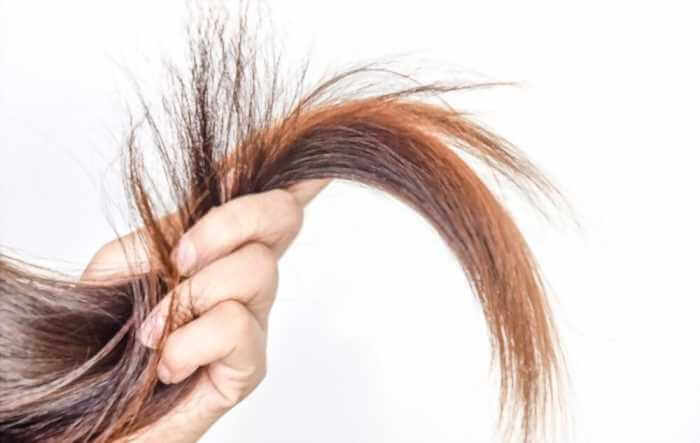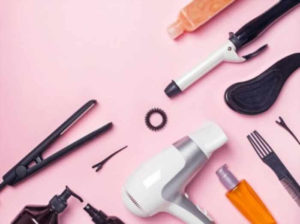Does your hair feel soft, full and thick when you run your hands through it?  Does the mirror reflect that shiny and healthy head of hair you want?
Does the mirror reflect that shiny and healthy head of hair you want?
Or do you have to admit that what you feel and see is less desirable?
Brittle and dry hair is the reality for many, not to mention the split ends that can be the inevitable consequence. What causes dry hair, and what’s the secret to those soft, lustrous strands?
What causes damaged or dry hair?
Let’s take a step back first: healthy hair starts with a healthy scalp. We may easily forget that the skin also extends beyond the hairline. Facial skin can be a good indicator to know the skin of the skull is in need – more sensitive “normal skin” applies to the whole body, including the scalp. Basically, dry hair and a dry scalp are not inseparable, although the condition of the scalp certainly affects the health of the hair: for example, hair loss can be aggravated by reduced scalp health, but dry hair is not always a consequence of a dry scalp.
Genetic predisposition determines normal, oily, dry or sensitive skin.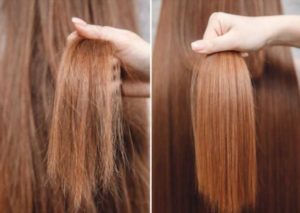 The sebaceous glands, which are responsible for sebum production, largely reflect your skin type. Oily skin produces more sebum than dry skin. And dry skin simply lacks moisture.
The sebaceous glands, which are responsible for sebum production, largely reflect your skin type. Oily skin produces more sebum than dry skin. And dry skin simply lacks moisture.
An optimally functioning skin regulates the amount of moisture very precisely. When the amount of skin fats is reduced, for whatever reason, the skin becomes more permeable to water, which disrupts the moisture balance in the skin. The epidermis can no longer retain moisture, and it simply evaporates.
Hair is naturally lubricated – the hair root produces oil to moisturize the hair and keep it shiny. Dry hair is caused when the hair does not produce enough oil, also with ageing, the oil production of the hair decreases. Every strand of healthy hair has a protective layer, known as the hair cuticle. The cuticle protects hair from heat and sun damage. Healthy cuticles lie tight together, as such they retain moisture. When the cuticles separate, the hair is neither properly protected nor able to retain its moisture.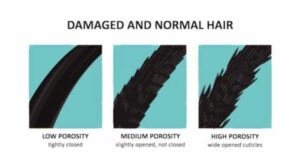
Dry hair results from an inadequate amount of moisture and oil in the hair, which are necessary to maintain the hair’s normal shine and texture. The hair can dry out when the production of sebum in the scalp is insufficient to properly moisturize the hair, or the moisture simply “escapes” from the hair.
Curly hair is more prone to dryness and dehydration is more likely to occur in long hair. And then there are the environmental factors that often lie at the basis of dry hair. Rubbing the scalp with a hard towel, excessive washing of the hair, using hot water and harsh soaps or styling products (which wash away the natural oils), frequent blow-drying and other styling methods using heat, chemical treatments such as dyeing or perms, exposure to sun, wind, dry air, air-conditioned environment, frequent bathing in the sea or chlorinated water, certain medications can all affect hair health. But don’t ignore the consequences of stress and incorrect nutrition!
Dry hair is porous and brittle. Dry hair is associated with dullness, hair that lacks its natural shine and healthy appearance; coarse and unruly hair that breaks easily and is often unmanageable for styling; split ends that feel dry and rough; tangles or tousled hair that easily becomes frizzy and static.
How to treat dry or damaged hair?
Regardless of the severity of the damage done, your hair’s health can be restored by mainly investing time and effort. Don’t expect a magical one-day solution, but with a little patience you will get there. Given the above causes, a number of measures are quite obvious and easy to implement.
Washing & Styling
Treat your hair as gently as you treat your skin. Wash your hair not too often – once or twice a week is sufficient – so the scalp can regain its natural balance, use lukewarm water and gentle, sulfate-free (natural) shampoos and moisturizing conditioners. Rinse the shampoo well to prevent soap residue from irritating the scalp.
Gently dry your hair with a soft towel. Wet hair is more “stretchy” and can be damaged or pulled out more easily. It is therefore advised not to comb the hair while it is still wet.
Avoid using heat sources (hair dryer, straightener or curling iron) as much as possible. These can make hair porous and brittle, and increase the risk of hair loss. Replace aggressive styling products by natural ones.
Choose rubber bands wisely. Make sure your hair can still “breathe”, preferably don’t use rubber bands when your hair is wet or while sleeping.
Massage
Give your scalp a relaxing massage to improve blood flow. Jojoba oil or coconut oil are well tolerated and are a perfect supplement for a good moisture balance of the scalp. Apply light pressure with your fingertips and make circular movements.
Lifestyle & Stress
 Adopt a healthy lifestyle, try to avoid stress as much as possible and nourish the skin from within as well. An overly drastic diet, malnutrition, lack or deficiency of vitamins A, C and E can be the cause of dry hair. So make sure you have a complete and varied diet. Put enough protein and healthy fats on the menu, drink 1.5 to 2 litres of water daily, but relaxation, sufficient exercise and a good night’s sleep also contribute to a healthy body, including skin and hair.
Adopt a healthy lifestyle, try to avoid stress as much as possible and nourish the skin from within as well. An overly drastic diet, malnutrition, lack or deficiency of vitamins A, C and E can be the cause of dry hair. So make sure you have a complete and varied diet. Put enough protein and healthy fats on the menu, drink 1.5 to 2 litres of water daily, but relaxation, sufficient exercise and a good night’s sleep also contribute to a healthy body, including skin and hair.
UV protection
Sun, sea, beach: most of us absolutely love it! Although we shouldn’t ignore the damage this can do to our hair. Just like the skin, the hair also needs protection from overexposure to the sun. UV rays can cause dry, dull and thin hair. In addition, your hair colour can fade due to sea and chlorine water. Wearing a hat or scarf protects your hair and keeps your scalp from burning. Additionally, wearing a scarf can also be super chic, right?
Wearing a hat or scarf protects your hair and keeps your scalp from burning. Additionally, wearing a scarf can also be super chic, right?
Due to a tight hair-do the hair dries out easily in the sun and will be more likely to break. Opt for “loose” hairstyle, such as a messy braid or messy knot.
We mentioned avoiding hot styling tools, right? Especially during the summer months, its use is an absolute no-go! Go for the natural approach: let the air dry your hair.
Condition your hair with oil. Argan oil is ideally suited for the care of dry hair. This oil is filled with vitamin E and antioxidants, which protects against the sun and prevents hair loss. Also coconut oil provides protection, by shielding each strand with a protective layer against the effects of sun and seawater.
How to treat split ends?
Chances are, if you suffer from dry hair, split ends aren’t a stranger to you either. A visit to the hairdresser is the most obvious advice here.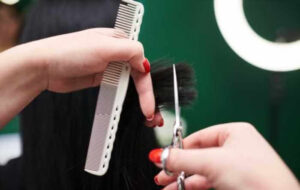 Hairdressers have special techniques to properly cut and hide split ends. This prevents them from wearing further upwards. Start with a clean slate – without split ends!
Hairdressers have special techniques to properly cut and hide split ends. This prevents them from wearing further upwards. Start with a clean slate – without split ends!
In the daily care of your hair, the above tips apply. In addition, applying a natural hair mask to the dry ends can be a good addition to your hair care. Leave the mask for five to ten minutes and then rinse. A suitable mask does not contain silicone or other synthetic ingredients that irritate or weigh down the hair. Applying a hair mask regularly, for example weekly, gives your hair a boost.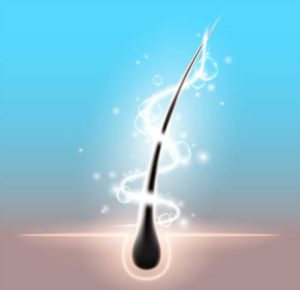
By regularly treating the hair ends with a nourishing oil, the hair regains its natural shine and becomes stronger and more resilient.
Be aware that some other disorders or conditions are related to dry hair, such as anorexia nervosa, menopause, underactive thyroid or parathyroid gland and hormonal abnormalities. Given tips can of course also be applied here, while a visit to a doctor can offer additional outcome for the relevant condition.
